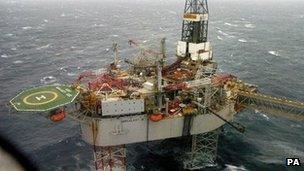Scottish independence: Ministers to set up commission on oil industry
- Published

Ministers say there are no plans to raise the industry's tax burden if independence is secured
An expert commission will be set up to examine how an independent Scotland could maximise the returns from North Sea oil and gas, the Scottish government has announced.
A new paper, external has set out the SNP administration's plans for the industry if it secures independence.
It stresses there are no plans to raise the sector's overall tax burden.
The paper also commits to formal consultation before any changes are made to the fiscal regime.
It details three overarching principles which underpin the proposed fiscal regime, stating that it must support and incentivise production and promote long-term stability and certainty.
Stability measures would include a commitment to formal consultation before future reforms and specific clarity on the fiscal treatment of decommissioning costs.
The Scottish government also said it would ensure there were efficient fiscal incentives to maximise economic recovery rates.
Expert commission
The paper states: "Given the industry's importance to Scotland's economy, Scottish ministers will shortly be announcing the creation of an expert commission to develop the proposals outlined in this paper.
"The Oil and Gas Expert Commission will build upon the approach and overarching principles set out in this paper, and provide advice on the technical application of the policy framework, which would underpin Scottish government policy in an independent Scotland."
The commission will be chaired by former CBI Scotland chairman Melfort Campbell, who co-chairs Scottish Enterprise's Oil and Gas Industry Advisory Group.
Responding to the paper's release, industry body Oil & Gas UK said it remained "firmly neutral" in the debate surrounding the referendum on Scottish independence, but added it welcomed the spotlight being shone on the positive economic impact of the oil and gas sector.
Chief executive Malcolm Webb said: "Predictability and long-term planning are what the industry requires of any government, particularly in the fiscal regime and the licensing and regulatory framework.
"The industry will also welcome government support in ensuring access to capital for growth for smaller companies, with developing the domestic and international supply chains, with innovation and the deployment of new technologies, as well as help in widening and deepening the skills pool.
"Oil & Gas UK is already working constructively with both the UK and Scottish governments on these important issues."
He added: "We will look forward to seeing the work of the Scottish government's new Oil and Gas Expert Commission when it ultimately reports."
'Stability and predictabilty'
Commenting on the paper, First Minister Alex Salmond said "stability and predictability" would underpin the taxation and regulatory regime for oil and gas production in an independent Scotland.
He added: "This is in contrast to the numerous substantial changes imposed by Westminster on the industry over the past decade, which have damaged both the industry and the Scottish economy.
"With more than half the total wholesale value of oil and gas reserves still to be extracted, record levels of field investment, and companies' future plans worth around £100bn, the sector in Scotland will continue to thrive for decades to come."
Mr Salmond added: "With Westminster having squandered the opportunities of the first half, it's up to us to make a better job of the second half."
'Valuable resource'
A UK government spokesman said: "Everyone agrees oil is a valuable resource, that's why the UK government has delivered a series of tax reliefs aimed at maximising investment in the North Sea.
"It's also why Sir Ian Wood is leading a review on how we maximise the economic benefits of oil and gas production.
"However, independent OBR forecasts show North Sea oil is also a volatile and declining resource.
"Basing Scotland's long-term economic future on over-optimistic projections is irresponsible."
He added: "Even on the Scottish government's preferred share of oil revenues, public spending in Scotland is £8bn higher than the taxes raised.
"With oil representing 20% of those revenues, the Scottish economy would be hugely vulnerable to volatility.
"Together within the UK, we have the broad shoulders to spread the risks and maximise the benefits."